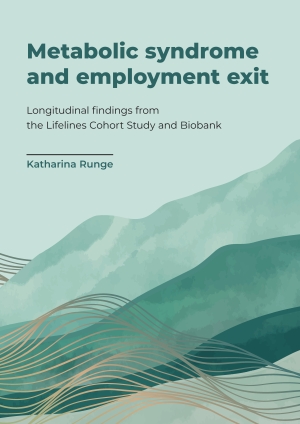Different groups of people act in different ways that may affect their health. This may be explained by two mechanisms. Whereas the causation mechanism suggests that people’s socio-economic and socio-demographic positions cause changes in health behaviors, the selection mechanism states that those who behave unhealthily sort into certain socio-economic and socio-demographic positions. In this project, we try to understand these mechanisms by studying what impact life-course transitions, such as divorcing or becoming unemployed, have on health behaviors. We use longitudinal data from the Lifelines study to investigate how life-course transitions impact health behaviors alongside more stable socio-economic characteristics.
Life-course transitions, socio-economic status and health behaviours
Theme:
Families and Gender
Publications
- Mangot-Sala, L., Bartoll-Roca, X., Sánchez-Ledesma, E., Cortés-Albaladejo, M., Liefbroer, A.C., Katherine, P. (2025), Emerging socioeconomic correlates of loneliness. Evidence from the Barcelona Health Survey 2021. Social Psychiatry and Psychiatric Epidemiology 60 (4): 917-929.
- Mangot-Sala, L., Smidt, N., Liefbroer, A.C. (2024), Hoe de covid-lockdowns de mentale gezondheid aantastten. Demos: bulletin over bevolking en samenleving 40 (4): 5-7.
- Mangot-Sala, L., Smidt, N., Liefbroer, A.C. (2024), Work- and mental health-related events and body mass index trajectories during the Covid-19 lockdown; evidence from the lifelines cohort study in the Netherlands. International Journal of Obesity 48 (3): 346-352.
-
Runge, K. (2024),Metabolic syndrome and employment exit: Longitudinal findings from the Lifelines Cohort Study and Biobank. Doctoral dissertation. Groningen: University of Groningen, 164 p.

- Runge, K., Zon, S.K.R. van, Henkens, K., Bültmann, U. (2024), Metabolic syndrome and poor self-rated health as risk factors for premature employment exit: a longitudinal study among 55 016 middle-aged and older workers from the Lifelines Cohort Study and Biobank. European Journal of Public Health 34 (2): 309-315.
-
Mangot-Sala, L. (2023),Disruptive life events and health: Longitudinal evidence from a large cohort in the Netherlands. Doctoral dissertation. Groningen: University of Groningen, 230 p.

- Mangot-Sala, L., Smidt, N., Liefbroer, A.C. (2023), Changes in anxiety and depression symptoms during the Covid-19 lockdown in the Netherlands. The moderating role of pre-existing mental health, employment situation and alcohol consumption. Social Psychiatry and Psychiatric Epidemiology 58 (10): 1561-1571.
- Runge, K., Ekamper, P. (2023), Toename extreme BMI-waarden onder jonge Nederlandse mannen. Demos: bulletin over bevolking en samenleving 39 (8): 8.
- Runge, K., Solinge, H. van (2023), Eén op de drie partners bezorgd over gezondheid van de recent-gepensioneerde. Demos: bulletin over bevolking en samenleving 39 (2): 8.
- Runge, K., Zon, S.K.R. van, Henkens, K., Bültmann, U. (2023), Metabolic syndrome increases the risk for premature employment exit: A longitudinal study among 60 427 middle-aged and older workers from the Lifelines Cohort Study and Biobank. Scandinavian Journal of Work, Environment & Health 49 (8): 569-577.
- Tran, K.A., Mangot-Sala, L., Liefbroer, A.C. (2023), Understanding trends in loneliness during the COVID-19 pandemic in The Netherlands: the moderating role of gender, age, and living arrangement. Aging & Mental Health 27 (11): 2267-2277.
- Mangot-Sala, L, Runge, K. (2022), The Lifelines Cohort Study: A rich data source for demographers. Demos, bulletin on population and society 38 (6): 5.
- Mangot-Sala, L., Smidt, N., Liefbroer, A.C. (2022), Disentangling the association between alcohol consumption and employment status: causation, selection or confounding? European Journal of Public Health 32 (6): 926-932.
- Mangot-Sala, L., Tran, K.A., Smidt, N., Liefbroer, A.C. (2022), The impact of the COVID lockdown on alcohol consumption in the Netherlands; the role of living arrangements and social isolation. Drug and Alcohol Dependence 233: 109349.
- Runge, K., Zon, S.K.R. van, Bültmann, U., Henkens, K. (2022), De ontwikkeling van het metaboolsyndroom onder oudere werknemers: beroepsverschillen en de rol van gezondheidsgedrag. Tijdschrift voor Bedrijfs- en Verzekeringsgeneeskunde.
- Runge, K., Zon, S.K.R. van, Bültmann, U., Henkens, K. (2022), Transitioning out of work and metabolic syndrome incidence: a longitudinal study among 13 303 older workers from the Lifelines Cohort Study and Biobank. Journal of Epidemiology and Community Health 76 (9): 779-785.
- Mangot-Sala, L., Smidt, N., Liefbroer, A.C. (2021), The association between unemployment trajectories and alcohol consumption patterns. Evidence from a large prospective cohort in The Netherlands. Advances in Life Course Research 50: 100434.
- Runge, K., Zon, S.K.R. van, Bültmann, U., Henkens, K. (2021), Metabolic syndrome incidence in an aging workforce: Occupational differences and the role of health behaviors. SSM - Population Health 15: 100881.
